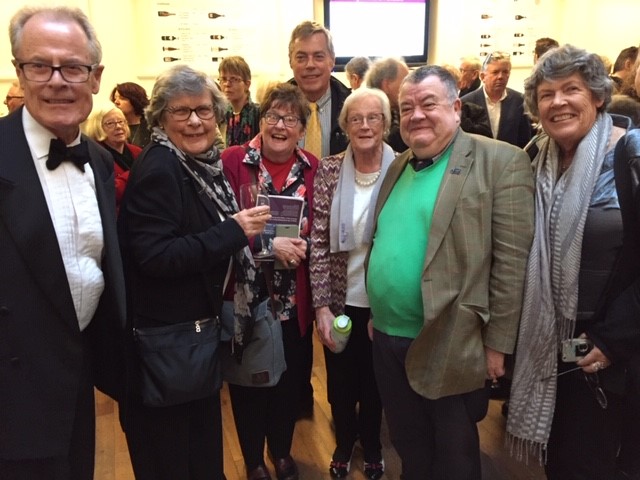
Stanford’s first opera – the Veiled Prophet – received a concert performance on 28 October at 5pm as part of Wexford Festival Opera, 2019. The result of a collaboration between Heritage Music Productions and Wexford Festival Opera, the performance took place on the main stage of Ireland’s National Opera House, Wexford, with the Festival Opera Orchestra and Chorus, conducted by prominent Irish conductor, David Brophy. The cast included a strong contingent of Irish singers – Sinead Campbell-Wallace (Zelica), Gavan Ring (Azim), Mairead Buicke (Fatima) and John Molloy (Abdullah) while the title role was be sung by Polish baritone, Simon Mechlinski who performed with great success at last year’s festival. The Wexford Festival Opera chorus was be supplemented with a chorus of opera students from the Conservatory of Music and Drama at TU Dublin (Technological University Dublin, formerly DIT).
The project had a strong archival element which included a video with high-quality audio. RTE Lyric fm relayed the audio recording to audiences across the European Broadcasting Union (EBU) through the prestigious Premiere Opera scheme.
Performances of operas by Irish composers have been sporadic over the past 50 years or more, but recently these works have begun to come to the fore. In 2008, a performance and CD recording was produced of Michael William Balfe’s Italian opera, Falstaff, to commemorate the composer’s bicentenary. In the same year, Gems of Irish Opera took place at the National Library of Ireland featuring excerpts from several key operas, one of which was The Veiled Prophet. Since then, some of these operas have been given in their entirety, including Robert O’Dwyer’s Eithne – the first opera to be performed in the Irish language – which was revived by Opera Theatre Company two years ago. 2019 has already seen performances of Balfe’s operetta, The Sleeping Queen at the Blackwater Valley Opera Festival and the Mananan International Festival on the Isle of Man. The Veiled Prophet is the latest to receive a complete performance and recording.
Moore’s story
Composed to a libretto by William Barclay Squire, The Veiled Prophet is based on part of the oriental romance, Lalla Rookh, by Ireland’s national poet, Thomas Moore. Moore’s poetic masterpiece enjoyed great celebrity in its own time and was translated into many languages. It also formed the basis of several other musical settings including operas by Gaspare Spontini, Félicien David and Anton Rubinstein and, perhaps most famously, the cantata Das Paradies und die Peri by Schumann.
Moore read widely on the fashionable subject of orientalism and used his vivid imagination in constructing his oriental world for, indeed, he had no experience of it. The story of The Veiled Prophet is contained within a frame tale in which the princess, Lalla Rookh (her name means ‘tulip cheek’) is on a journey from Delhi to Cashmere where she is to be married. Along the way, the minstrel Feramorz entertains the princess with his colourful tales, the first of these being the Veiled Prophet of Khorassan.
Mokanna, the Veiled Prophet, has lost an eye in combat and hides his deformity under a veil while passing himself off as a god. He gains many followers and establishes his power in various parts of the Mavaralnahar. Aware of this power, the Caliph Mahadi sends an army to arrest Mokanna. However, when the prophet sees no route of escape, he administers poison to his followers, and when they are dead, he throws himself into the fire used to burn their bodies so that the Caliph’s soldiers can find no trace of him. While details of Barclay Squire’s libretto deviate in some respects from Moore’s original story, the striking feature of both can be seen in their likeness to a modern cult, the members of which blindly follow their master to their doom. It also foreshadows the final actions of dictators such as Hitler.
As to Stanford’s opera, it has a chequered history like many English operas of its time. Its first performance took place in 1881 in Hanover, Germany as Der Verschleierte Profet, sung in German. The first British outing in 1893 was at Covent Garden as Il Profeta velato, but this time sung in Italian. The opera was never produced in English during Stanford’s lifetime.
This production of The Veiled Prophet had been in gestation for a while. It was one of four operas included in a recent scoping report prepared for the Arts Council at which time it was ascertained that the conductor’s score and orchestral sets were missing. President and Musical Advisor of the Stanford Society, Jeremy Dibble, had been closely involved as consultant on the project and undertook the reconstruction of the score. With the success of last year’s production of The Travelling Companion, the performance of The Veiled Prophet at Wexford Festival Opera hopefully encouraged further interest in Stanford’s much-neglected operas and lead to a fully-staged production in the not too distant future.
Una Hunt
Producer, The Veiled ProphetWexford Festival Opera 2019.
Reviews of The Veiled Prophet performed at the Wexford Opera Festival:
https://www.gramophone.co.uk/review/stanford-the-travelling-companion-purser
You can listen to the recording of this opera at the following link:
https://www.rte.ie/radio/radioplayer/html5/#/lyric/11112290
You can read the Wexford programme HERE.

